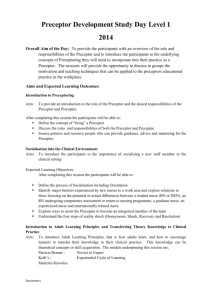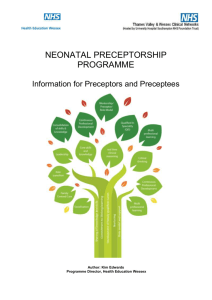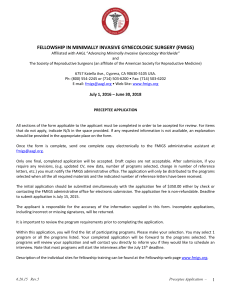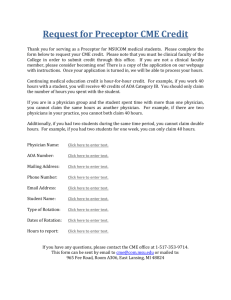Medical Students, NP Students, PA Students and Physician
advertisement
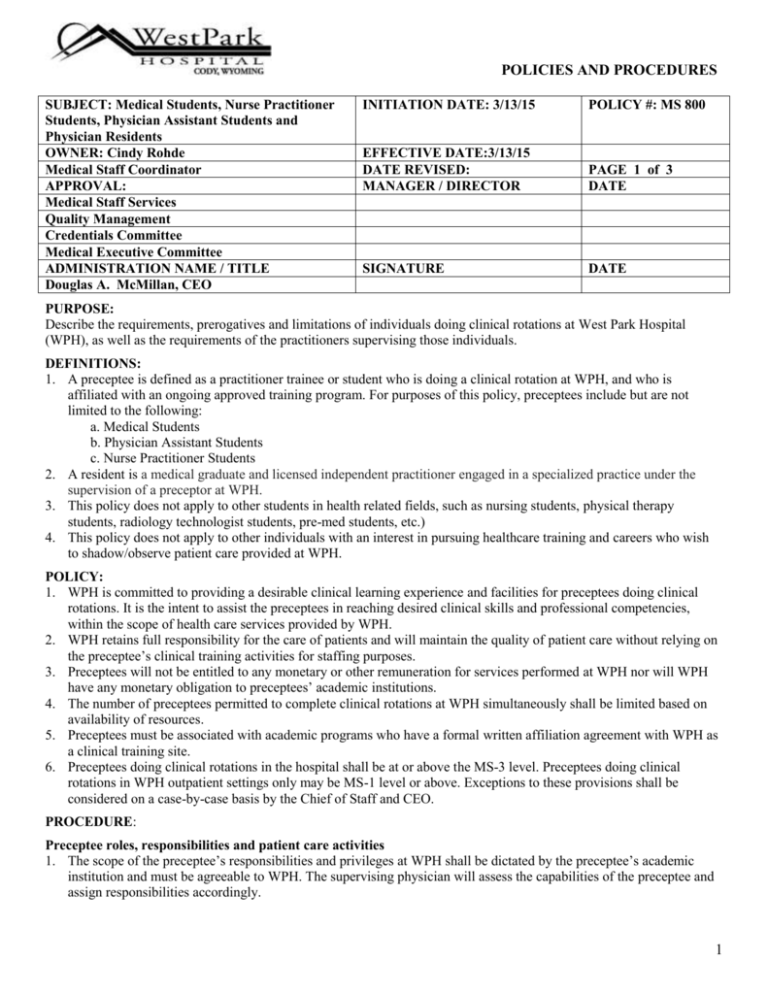
POLICIES AND PROCEDURES SUBJECT: Medical Students, Nurse Practitioner Students, Physician Assistant Students and Physician Residents OWNER: Cindy Rohde Medical Staff Coordinator APPROVAL: Medical Staff Services Quality Management Credentials Committee Medical Executive Committee ADMINISTRATION NAME / TITLE Douglas A. McMillan, CEO INITIATION DATE: 3/13/15 POLICY #: MS 800 EFFECTIVE DATE:3/13/15 DATE REVISED: MANAGER / DIRECTOR PAGE 1 of 3 DATE SIGNATURE DATE PURPOSE: Describe the requirements, prerogatives and limitations of individuals doing clinical rotations at West Park Hospital (WPH), as well as the requirements of the practitioners supervising those individuals. DEFINITIONS: 1. A preceptee is defined as a practitioner trainee or student who is doing a clinical rotation at WPH, and who is affiliated with an ongoing approved training program. For purposes of this policy, preceptees include but are not limited to the following: a. Medical Students b. Physician Assistant Students c. Nurse Practitioner Students 2. A resident is a medical graduate and licensed independent practitioner engaged in a specialized practice under the supervision of a preceptor at WPH. 3. This policy does not apply to other students in health related fields, such as nursing students, physical therapy students, radiology technologist students, pre-med students, etc.) 4. This policy does not apply to other individuals with an interest in pursuing healthcare training and careers who wish to shadow/observe patient care provided at WPH. POLICY: 1. WPH is committed to providing a desirable clinical learning experience and facilities for preceptees doing clinical rotations. It is the intent to assist the preceptees in reaching desired clinical skills and professional competencies, within the scope of health care services provided by WPH. 2. WPH retains full responsibility for the care of patients and will maintain the quality of patient care without relying on the preceptee’s clinical training activities for staffing purposes. 3. Preceptees will not be entitled to any monetary or other remuneration for services performed at WPH nor will WPH have any monetary obligation to preceptees’ academic institutions. 4. The number of preceptees permitted to complete clinical rotations at WPH simultaneously shall be limited based on availability of resources. 5. Preceptees must be associated with academic programs who have a formal written affiliation agreement with WPH as a clinical training site. 6. Preceptees doing clinical rotations in the hospital shall be at or above the MS-3 level. Preceptees doing clinical rotations in WPH outpatient settings only may be MS-1 level or above. Exceptions to these provisions shall be considered on a case-by-case basis by the Chief of Staff and CEO. PROCEDURE: Preceptee roles, responsibilities and patient care activities 1. The scope of the preceptee’s responsibilities and privileges at WPH shall be dictated by the preceptee’s academic institution and must be agreeable to WPH. The supervising physician will assess the capabilities of the preceptee and assign responsibilities accordingly. 1 POLICIES AND PROCEDURES 2. The preceptee or his/her academic institution who has an affiliation agreement with WPH shall notify WPH Medical Staff Services of the preceptee’s clinical rotation plans to obtain application materials at least one (1) month prior to the start of the clinical rotation. 3. Preceptees who fail to comply with #2 above may be subject to cancellation of their clinical rotation. 4. Preceptees will sign and adhere to the provisions of the WPH confidentiality statement, maintaining confidentiality regarding patient, provider and hospital information as required by hospital policies. 5. Preceptees are required to attend a hospital orientation and training organized by Medical Staff Services. Orientation information will include: a. Training on the provider electronic health record. b. A tour of WPH facilities. c. A WPH badge (which must be returned at the end of the rotation). d. Safety information, emergency procedures and code designations. 6. Preceptees shall be subject to applicable provisions of the hospital and Medical Staff bylaws, rules, regulations, and policies. 7. Preceptees are expected to become familiar with, and adhere to, all safety and emergency procedures and code designations, including but not limited to fire, disaster, bomb threat, infection control, incident reporting, etc. 8. Appropriate to their level of training, preceptees may evaluate: a. Patients in the hospital, b. Patients in Long Term Care Center (LTCC), c. Outpatient departments, and; d. Emergency department. 9. Preceptees shall document their findings; perform history and physical examinations; document admission and discharge notes; document progress notes. Residents may enter orders. (See “Supervision of Preceptees” #11 and # 12). 10. It is the preceptee’s’ responsibility to communicate effectively with his/her supervising physician regarding the findings of his/her evaluation, physical examination, interpretation of diagnostic tests and intended interventions on a continuous basis. 11. The preceptee must notify the appropriate attending or consulting physicians of any change in a patient’s condition. 12. Preceptees may assist at surgery and during other invasive procedures, appropriate to their level of training, only a. Under the direct supervision and physical presence of a preceptor with appropriate privileges; and; b. After an orientation to the OR. 13. Preceptees may attend Medical Staff meetings at the discretion of the Chief of Staff and Medical Staff Committee meetings at the discretion of the committee chair (not including executive sessions), but may not vote on matters brought before the Medical Staff or the committee. 14. Preceptees are expected to participate in Medical Staff educational activities offered during their WPH clinical rotation (CMEs, case presentations, journal clubs, etc.). 15. Preceptees will wear appropriate attire and name tags and will present and conduct themselves in a professional manner according to the WPH code of conduct. 16. Prior to their clinical rotation at WPH, preceptees will have documented proof of training in universal precautions and transmission of blood-borne pathogens. Approval of Preceptee Applications 1. Preceptee requests for clinical rotations at WPH shall be approved by the Chief of Staff and CEO for a specific time period. 2. Applications of residents, because they are licensed independent practitioners, are subject to the Credentials Committee, Medical Executive Committee and WPH Board of Trustees approval process. Supervision of Preceptees 1. Preceptees and preceptors should clarify the preceptee’s learning objectives for his/her clinical rotation along with his/her academic program’s requirements as well as the preceptor’s expectations of the preceptee. 2. Preceptees will work under the direct supervision of physicians who hold clinical privileges that reflect the patient care responsibilities given to the preceptee (e.g., a preceptee who is allowed to take a history and physical must be supervised by a practitioner with H & P privileges). 3. The supervising physician is defined as that individual who has immediate oversight responsibility of all aspects of patient care rendered by the preceptee. In most cases, the supervising physician is also the attending physician or consultant on the case. 4. The mechanisms by which the supervisor shall make decisions about each participant’s progressive involvement and independence in specific patient care activities include but are not limited to the following: POLICIES AND PROCEDURES 5. 6. 7. 8. 9. 10. 11. 12. a. Direct observation of the preceptee by the supervisor. b. Consultation by the supervisor with the preceptee and other caregivers working with the preceptee regarding the preceptee’s performance. c. Review of the preceptee’s documentation in patients’ medical records by the supervisor. d. Proctoring of the preceptee by the supervisor in specific patient care activities. e. Simulation of specific patient care activities. f. Testing the preceptee regarding specific patient care activities. All aspects of patient care are ultimately the responsibility of the attending physician and involved consultants. Attending physicians have the right to prohibit preceptee participation in the care of their patients without penalty. When allowing care of their patients by preceptees, attending physicians and consultants do not relinquish their rights or responsibilities to examine and interview; admit or discharge; enter orders, progress notes and discharge summaries; obtain consultations. When physicians are billing for services, those services must have been performed by and documented by the billing physician rather than the preceptee. Attending and consultant physicians must document that they, rather than the preceptee, have personally performed the key components of each medical encounter. All preceptee entries in the medical record will be countersigned by the patient’s attending physician within twentyfour (24) hours (not applicable to residents). The attending physician and consulting physicians must review all entries by the preceptee in the medical record on a daily basis and make any necessary corrections in the entries. The supervising physician will review orders and prescriptions. Communication/Reporting of Preceptee Activities 1. Medical Staff Services will report on a monthly basis to the Credentials Committee a list all preceptees completing clinical rotations at WPH. The report will include the date of the preceptees’ evaluations. 2. Hospital staff will report any patient safety or quality of care issues involving preceptees to the Quality and Risk Management Manager. 3. The Medical Executive Committee will oversee the resolution of those issues with the preceptee and the preceptor. 4. WPH will take immediate action to correct a situation where a preceptee’s actions endanger patient care. RELATED FORMS: Medical Student Application REFERENCE: n/a
